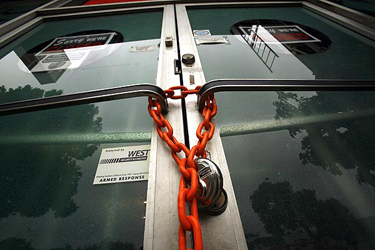Officials with the Los Angeles city attorney's office Monday said they believe there will be "substantial compliance" with an ordinance that shuts down more than 400 medical marijuana dispensaries that opened over the last two and a half years.

The director of the Rainforest Collective in Los Angeles chained and padlocked his doors in compliance with the new city ordinance. (Mark Boster / Los Angeles Times / June 7, 2010)
But Assistant City Atty. Asha Greenberg said her office wouldn't rule out taking "enforcement action" against possible holdouts.
"I don't think anyone should assume they can remain open and that the city is not going to take any action any time soon," Greenberg said. "It's a definite possibility. Anyone who is not living in a cave" knows that the ordinance went into effect Monday.
Reports from police officers, building inspectors and residents will help identify possible violators. City prosecutors also set up an e-mail address for the public to report scofflaws: [email protected].
Offenders face civil penalties of $2,500 a day and six months in jail. Dispensaries that registered with the city in 2007 will have until Monday to file paperwork showing their intent to comply with new location restrictions.
Signs posted on the doors of the City Clerk's office Monday indicated that staff members were prepared for an onslaught of medical marijuana operators filing notices of intent to register on the first available day.
But things seemed to run smoothly with only a handful of people in line by mid-morning. By noon, about 50 people had been through the office to submit paperwork on their intent to register, a process that took about 20 minutes.
"I thought it was going to be a little crazy," James Catipay, 33, said as he exited the office with his business partner, Peter Tejera. The two operate Herbalcure in Los Angeles and although they have a week to file the paperwork, they wanted to do it as soon as possible.
"It demonstrates responsibility," said Tejera, 41, a real estate consultant.
Catipay and Tejera said they opened Herbalcure in 2007 because they wanted others to benefit from the remedy they had used to relieve their own pain left by illnesses.
Tejera said he found that cannabis relieved the pounding headaches that came after an aneurysm. Catipay, an attorney, said he used marijuana to address the breathing problems left by sarcoidosis.
Both believe the city's regulation of marijuana collectives is a wise move.
"There need to be guidelines," Tejera said. "The city has to get control of what's going on from a safety standpoint."
The new ordinance prohibits dispensaries from being located within 1,000 feet of "sensitive use" areas such as schools, churches and parks, setting the stage for the closure of more than 400 outlets.
Attorney Eric Shevin, who is representing more than a dozen medical marijuana patients in a class-action lawsuit against the city, argued that the law would unconstitutionally bar patients' access to their medicine.
On Friday, Los Angeles County Superior Court Judge James C. Chalfant rejected their bid for a temporary restraining order. The judge did ask for additional arguments on whether allowing certain dispensaries to remain open while closing others would be a violation of the equal protection clause of the California Constitution.
Shutting down some 400 existing dispensaries would have tremendous fallout, both economically and practically, said Shevin, who accused city officials of changing the rules on the collectives that existed before 2007 by prohibiting transfer of ownership.
"Landlords, who have been relying on this rental income, are going to have leases terminated," Shevin said. "The overall effect will take time to play out but the types of things we can expect to see are that patients are going to have difficulty obtaining their medicine and the few stores that remain will have difficulty meeting the demand."











